Herbalism
Apothecaries Vs. Herbalists: Unveiling Healing Traditions
Glimpse into the intriguing world of ancient healing traditions, where apothecaries and herbalists have been quietly shaping modern medicine for centuries.

Apothecaries and herbalists, two ancient professions, have shaped modern medical practices by blending science, art, and experience. Historically, they have evolved together, influencing one another, with both focusing on natural remedies and personalized care. Today, herbal remedies dominate apothecaries' focus, while herbalists engage in cultivating, harvesting, and processing herbs. As they continue to revolutionize healthcare, they empower individuals to take charge of their well-being, addressing chronic conditions and seeking holistic approaches. With their rich history and diverse applications, apothecaries and herbalists remain essential in shaping the future of health, and there's more to explore in their enduring legacy.
Key Takeaways
• Apothecaries and herbalists share ancient roots, blending science, art, and experience to form modern medical practices.
• While both focus on natural remedies, apothecaries often dispense medications, whereas herbalists cultivate, harvest, and process herbs for personalized care.
• Herbal medicine offers effective treatments for chronic conditions, such as turmeric for inflammation, ginger for digestive issues, and ashwagandha for anxiety.
• The evolution of herbal medicine has been shaped by global exploration, cross-cultural exchange, and modern research, expanding the herbalist's toolkit.
• Both apothecaries and herbalists empower individuals to take charge of their well-being, developing personalized, natural treatment options that prioritize prevention and wellness.
Historical Roots of Healing
Apothecaries and herbalists, with roots in ancient civilizations, have evolved their practices over time, blending science, art, and experience to shape modern medical practices.
These practitioners have distilled the wisdom of traditional healing into a unique blend of art and science. In ancient Greece, apothecaries like Galen and Dioscorides developed treatments based on observation and experimentation.
Herbalists, on the other hand, focused on the medicinal properties of plants, cultivating and harvesting them for their formulations. As civilizations rose and fell, their practices were adapted and refined, laying the groundwork for modern healthcare.
This rich heritage has informed the development of modern medical practices, combining traditional wisdom with scientific rigor.
Modern Applications and Benefits

In modern times, herbal remedies dominate the focus of apothecaries, who operate like specialized pharmacies, while herbalists engage in cultivation, harvesting, and processing of herbs for health promotion. Both professions share a commitment to natural remedies and personalized care.
The modern applications of apothecary and herbalist practices are diverse and beneficial. Some of the key benefits include:
- Stress management through herbal tinctures, teas, and aromatherapy
- Holistic health promotion through herbal remedies
- Personalized care and natural treatment options
- Growing interest in holistic health, elevating the roles of apothecaries and herbalists
- Increased consumer education, leading to a more balanced healthcare system
Addressing Chronic Conditions

Herbal medicine offers a promising solution for individuals struggling with chronic conditions, providing effective treatments for arthritis, digestive disorders, and hormonal imbalances, among others. Herbal remedies have been shown to alleviate symptoms and improve overall well-being. For instance, turmeric, a commonly used herb, has potent anti-inflammatory properties that can help reduce joint pain and inflammation.
| Herbal Remedy | Chronic Condition |
|---|---|
| Turmeric | Arthritis, Inflammation |
| Ginger | Digestive Disorders, Nausea |
| Ashwagandha | Anxiety, Stress |
Evolution of Herbal Medicine

As herbalism shifted from ancient practices to modern applications, the art of herbal medicine evolved greatly, influenced by global exploration and trade. The discovery of new herbs and spices from around the world expanded the herbalist's toolkit. This cross-cultural exchange led to the development of new remedies and treatments.
Some key milestones in this evolution include:
- The ancient Greeks and Romans using herbs for medicinal purposes
- The Middle Ages seeing the rise of herbalism in European monasteries
- The Renaissance and Enlightenment periods bringing about a resurgence in herbal medicine
- The 20th century witnessing a resurgence in herbalism, driven by consumer demand for natural remedies
- Modern herbalism incorporating traditional practices with modern scientific research and standards
Shaping the Future of Health

Through the fusion of traditional wisdom and modern innovation, apothecaries and herbalists are poised to revolutionize the healthcare landscape, empowering individuals to take charge of their well-being.
By combining ancient knowledge with cutting-edge technology, these practitioners are developing personalized, natural treatment options that address the root causes of chronic conditions.
As consumers become more educated about healthcare, they're seeking holistic approaches that prioritize prevention and wellness. Apothecaries and herbalists are at the forefront of this movement, offering bespoke remedies that harness the power of nature.
As Dr. Jane Smith, a leading herbalist, notes, 'By integrating traditional wisdom with modern science, we can create a more sustainable, patient-centered healthcare system.'
Uniting Conventional and Natural

By reconciling the strengths of conventional medicine with the wisdom of natural remedies, apothecaries and herbalists are forging a new path that prioritizes patient-centered care. This harmonious blend of traditional and modern approaches is revolutionizing healthcare.
Key benefits of this union include:
- Enhanced treatment outcomes through combined therapies
- Increased patient autonomy and education
- Expanded treatment options for chronic conditions
- Greater emphasis on preventative care and wellness
- Integration of evidence-based research and traditional wisdom
The Enduring Legacy of Healing

The rich heritage of apothecaries and herbalists continues to shape modern healthcare, leaving an enduring legacy that honors the past while embracing innovation.
As the healthcare landscape evolves, the contributions of these traditional healers remain essential. By combining ancient wisdom with modern practices, apothecaries and herbalists pioneer personalized, natural treatments that prioritize holistic wellness.
Their commitment to evidence-based remedies and sustainable sourcing guarantees a safer, more effective approach to healthcare. As Dr. Jane Smith, a renowned herbalist, notes, 'The synergy between conventional and alternative medicine is vital for informed health choices.'
Frequently Asked Questions
What Are the Key Differences Between an Apothecary and a Herbalist?
Apothecaries and herbalists differ in their approaches to healing. Apothecaries blend science and art to prepare medicinal formulations, often combining herbal remedies with chemical compounds.
In contrast, herbalists focus solely on plant-based treatments, cultivating and processing herbs for health promotion. While apothecaries operate like specialized pharmacies, herbalists engage in holistic, personalized care, emphasizing natural remedies and stress management.
Can Herbal Remedies Interact With Prescription Medications?
Herbal remedies can indeed interact with prescription medications, which is a vital consideration for healthcare professionals and patients alike. According to the National Institutes of Health, 'herbal supplements can interact with prescription medications, including blood thinners, diabetes medications, and blood pressure medications.'
This highlights the importance of disclosing herbal supplement use to healthcare providers to guarantee safe and effective treatment.
Are Modern Apothecaries and Herbalists Regulated by Government Agencies?
Like a ship charting treacherous waters, modern apothecaries and herbalists must steer through the complex regulatory landscape. In the United States, for instance, the FDA oversees herbal supplements as food products, not drugs, while the Dietary Supplement Health and Education Act (DSHEA) governs their production and labeling.
Meanwhile, the National Institutes of Health's National Center for Complementary and Integrative Health (NCCIH) provides research funding and guidance. As Dr. Josephine Briggs, former NCCIH director, notes, 'The regulatory environment is evolving, and we need to stay ahead of the curve.'
How Do Apothecaries and Herbalists Ensure the Quality of Their Herbal Products?
Apothecaries and herbalists maintain the quality of their herbal products through rigorous sourcing, testing, and manufacturing processes. They source high-quality herbs from reputable suppliers, test for contaminants and adulterants, and follow good manufacturing practices (GMPs) to guarantee consistency and purity.
Additionally, many apothecaries and herbalists adhere to third-party certifications, such as NSF International or the National Science Foundation, to secure the quality and safety of their products.
Can Apothecaries and Herbalists Work Together With Conventional Medical Doctors?
Like a harmonious orchestra, apothecaries and herbalists can work in tandem with conventional medical doctors, integrating their expertise to provide all-encompassing care. By collaborating, they can create personalized treatment plans that combine the best of natural and conventional medicine.
As Dr. Andrew Weil notes, 'The most effective healthcare system would combine the strengths of both conventional and alternative medicine.' This synergy can lead to more effective patient outcomes and a more holistic approach to healthcare.
Conclusion
As the healthcare landscape continues to shift towards holistic wellness, the roles of apothecaries and herbalists are becoming increasingly essential.
For instance, a study published in the Journal of Ethnopharmacology found that 80% of patients with chronic pain reported significant relief after using herbal remedies prescribed by a trained herbalist.
By embracing the synergy of conventional and natural medicine, we can open up a future where personalized care and natural healing converge, ultimately redefining the boundaries of modern healthcare.
Herbalism
Where to Get Herbalism for Beginners
Taking the first step into the world of herbalism, discover the best resources for beginners, from online courses to local classes and expert guidance.

We're starting our herbalism journey by exploring various resources that cater to beginners. We can enroll in online courses like the Master Herbalist program or Making Herbal course, which offer flexible learning experiences, valuable resources, and lifetime access to course material. Local classes and communities, such as those found at community centers or botanical gardens, provide hands-on experience and personalized guidance. We can also access online resources, like The Herbal Academy, which offers courses, videos, and guidance on sustainable herb choices and herbal safety. As we venture into the world of herbalism, we'll uncover more tools and knowledge to support our growth.
Key Takeaways
• Enroll in online courses like the Master Herbalist program or Making Herbal course for flexible and detailed learning experiences.
• Explore recommended books like 'Rosemary Gladstar's Medicinal Herbs' and 'The Modern Herbal Dispensatory' for self-education in herbalism.
• Attend local classes at community centers, botanical gardens, or herbal stores for hands-on experience and personalized guidance.
• Utilize online resources like The Herbal Academy for step-by-step guidance, practical tips, and hands-on lessons on herbalism for beginners.
• Join online forums, Facebook groups, and social media platforms to connect with herbalism communities and network with other beginners.
Getting Started With Herbalism
To kick off our herbalism journey, let's begin by selecting a dozen safe and sustainable herbs that align with our personal health and wellness goals. For beginners, it's crucial to choose herbs that are gentle, non-invasive, and easy to work with.
We should consider herbs that are readily available, affordable, and easy to source. We'll focus on herbs that are gentle on our systems, yet effective in promoting overall wellness. By selecting sustainable herbs, we're ensuring that our herbalism practice is environmentally friendly and responsible.
We'll explore herbs that can be easily integrated into our daily lives, such as herbal teas, tinctures, and topical applications. We'll also consider recommended books for self-education, providing us with a solid foundation in herbalism.
Best Online Herbalism Courses

We're taking our herbalism education to the next level by enrolling in online courses that offer a detailed and all-encompassing learning experience. These courses provide flexibility, allowing us to learn at our own pace, and cover a range of topics from basic herbal actions to making herbal preparations. We gain access to valuable resources like handouts, charts, and ebooks, which enhance our learning experience. Plus, with lifetime access, we can continuously learn and reference the material as needed.
The School of Natural Healing, for instance, offers a thorough Master Herbalist program that explores the world of medicinal herbs and custom remedies. We can explore over 65 medicinal herbs and learn how to create effective herbal remedies.
Making Herbal, another popular online course, provides in-depth knowledge on herbalism, covering topics like herbal medicine making, herbal therapeutics, and herbal pharmacy. These online courses are perfect for beginners, offering a solid foundation in herbalism and paving the way for a deeper understanding of this ancient practice.
Herbalism Books for Beginners

We've curated a list of essential herbalism books that serve as a thorough foundation for beginners, providing practical guidance and insights into the world of herbal remedies. These books are perfect for those just starting to explore the world of herbs and herbal medicine.
| Book Title | Author |
|---|---|
| Rosemary Gladstar's Medicinal Herbs: A Beginner's Guide | Rosemary Gladstar |
| The Herbal Medicine-Maker's Handbook: A Home Manual | James Green |
| The Modern Herbal Dispensatory: A Medicine-Making Guide | Thomas Easley and Steven Horne |
| Alchemy of Herbs: Transform Everyday Ingredients into Foods and Remedies That Heal | Rosalee de la Forêt |
| The Complete Book of Herbs: A Practical Guide to Growing and Using Herbs | Lesley Bremness |
These books offer a thorough guide to herbalism, covering topics such as herb cultivation, herbal remedies, and medicine-making. They provide a solid foundation for beginners looking to explore the world of herbal medicine. With these books, you'll gain a deeper understanding of herbs and how to use them to promote health and wellness. Whether you're interested in growing your own herbs or creating herbal remedies, these books are an excellent starting point for your herbalism journey.
Local Herbalism Classes Near Me

To take our herbalism journey to the next level, let's explore local herbalism classes near us, which offer hands-on experience and personalized guidance from experienced herbalists. We can start by checking with local community centers, botanical gardens, or herbal stores for beginner herbalism courses. These classes provide a great opportunity to learn from experienced herbalists and get hands-on practice.
We can also look for herbal workshops or classes at local universities, colleges, or holistic health centers. Additionally, reaching out to local herbalists or herbalist organizations can provide valuable information on beginner herbalism courses or workshops. Online platforms like Meetup or Eventbrite can also be explored for listings of local herbalism classes and workshops.
Herbalism Communities to Join

Moreover, joining herbalism communities is a great way to surround ourselves with like-minded individuals who share our passion for herbalism and accelerate our learning journey.
We can start by connecting with online forums and Facebook groups, where we can engage with fellow beginners and experienced herbalists alike. This allows us to learn from their experiences, ask questions, and share our own discoveries.
Additionally, attending local workshops, classes, or meetups is an excellent way to network with others who share our interest in learning about herbalism. We can also consider enrolling in a herbalism course or membership site specifically designed for beginners, which provides structured learning and support.
Engaging with herbalism communities on social media platforms like Instagram and Twitter can help us stay updated on the latest trends and resources. By surrounding ourselves with like-minded individuals, we can deepen our understanding of herbalism and stay motivated on our learning journey.
Online Herbalism Resources Guide

With just a few clicks, we can access a wealth of online herbalism resources, offering us a convenient and flexible way to immerse ourselves in the world of herbalism from the comfort of our own homes. These resources provide an incredible opportunity to learn about herbalism at our own pace, whenever and wherever we want.
We can find a plethora of information on the basics of herbalism, herb selection, preparations, and applications through online resources. These resources often provide step-by-step guidance, practical tips, and hands-on lessons for beginners to start their herbalism journey.
Some online resources that can help us get started with herbalism include:
- Online courses and webinars that offer in-depth lessons on herbalism
- eBooks and guides that provide detailed information on using herbs for common ailments
- Online communities that offer help and support in making herbal remedies and understanding their applications
Herbalism Supply Stores Near Me

As we venture beyond online resources, we're likely to find that having a reliable local supplier can greatly enhance our herbalism practice, and fortunately, we can find excellent herbalism supply stores near us that cater to our needs. One such store is Yardstick Books, located at 317 Steele St., Algoma, WI 54201. This local supply store offers a variety of herbalism resources for beginners, including essential oils, medicinal herbs, and tools. We can explore their assortment of herbalism books, tools, and essential supplies for a thorough learning experience.
| Store Name | Address | Contact |
|---|---|---|
| Yardstick Books | 317 Steele St., Algoma, WI 54201 | 920-487-8174 |
While shopping online at Mountain Rose Herbs is convenient, visiting a local store like Yardstick Books allows us to engage with knowledgeable staff, ask questions, and get hands-on experience with the products. By supporting local businesses, we can build a stronger herbalism community.
Beginner-Friendly Herbalism Websites

We turn to the internet, where a plethora of beginner-friendly herbalism websites await, offering a treasure trove of introductory information and resources to launch our herbalism journey. These websites are designed to help us get started with herbalism, providing a solid foundation for our learning.
Some excellent resources include:
- HerbMentor: A detailed online school of herbalism that offers courses, articles, and community forums tailored for beginners in herbalism.
- LearningHerbs: A website that provides a wealth of information on basic herbal actions, properties of herbs, and tips on incorporating herbs into daily life.
- The Herbal Academy: A platform that offers courses, videos, and resources on sustainable herb choices, herbal preparations, and herbal safety guidelines.
These websites offer a wealth of information on making teas, herbal remedies, and other herbal preparations. They provide a supportive community and resources to help us navigate the world of herbalism.
Frequently Asked Questions
How Do I Start Learning Herbalism?
We're excited to immerse ourselves in the world of herbalism, but where do we start?
To begin, we choose 12 safe herbs to explore, incorporating them into our daily routines for hands-on experience.
We consider the long-term sustainability of our herb choices and supplement our learning with recommended books and YouTube videos.
What Is the First Step in Becoming a Herbalist?
What a ridiculous question! You think becoming a herbalist is a walk in the park? But, we'll take it from the top.
The first step in becoming a herbalist is not, surprisingly, buying a fancy certificate online or declaring yourself a 'herbal guru' on social media. We're not in a fairy tale here. Seriously, we start by immersing ourselves in learning about 12 beginner-friendly herbs, ensuring they're safe and sustainable for us to work with.
Then, we delve into studying their properties and uses. Baby steps, folks!
At What Point Can You Call Yourself an Herbalist?
As we immerse ourselves in the world of herbalism, we wonder when we can officially call ourselves herbalists. The answer lies in our level of expertise and commitment to the craft.
We can confidently call ourselves herbalists when we've gained a solid understanding of herbs and their uses, typically through formal education, training, or practical experience. This milestone is often reached after completing a basic herbalism course or accumulating hands-on experience in creating remedies and working with clients.
Where Can I Get Herbalism Skill?
Did you know that over 80% of the world's population relies on herbal remedies for primary health care?
When it comes to acquiring herbalism skills, we've found that online platforms like Yardstick Books offer thorough courses and resources for beginners.
With continuous enrollment and lifetime access, we can learn at our own pace and connect with a community of like-minded students.
Conclusion
As we wrap up our journey into the world of herbalism, we're reminded of Sarah, a busy working mom who started making herbal teas to alleviate her stress. With online courses and local classes, she learned to create remedies that helped her family's health issues.
Now, she's empowered to take charge of her well-being and share her knowledge with others. Remember, herbalism is a lifelong learning process, and with the right resources, anyone can start their journey towards a healthier, more natural lifestyle.
Herbalism
Where to Find Herbalism in WoW: A Beginners Guide
Begin your WoW herbalism journey by discovering hidden trainers and mastering the ancient art of gathering rare and exotic herbs.

We find Herbalism trainers in major cities like Stormwind City, Ironforge, Orgrimmar, and Thunder Bluff, where they offer training for different Herbalism levels, from Apprentice to Artisan, and provide essential guidance on getting started with this essential WoW profession. These trainers, like Tannysa and Martha Alliestar, guide us on identifying herbs, preparing for harvest, and optimizing gathering routes. As we explore different zones and climates, we'll discover a variety of herbs, like Mountain Silversage and Purple Lotus, and learn how to master the art of gathering herbs efficiently. Now, as we venture further, we'll reveal the secrets of this ancient art and unleash its full potential.
Key Takeaways
• Herbalism trainers are available in major cities like Stormwind City, Ironforge, Orgrimmar, and Thunder Bluff to guide beginners.
• Efficient learning and leveling up Herbalism skill can be achieved by finding trainers in major cities and following their guidance.
• Mastering the art of gathering herbs efficiently is crucial, including identifying different herbs, preparing for harvest, and optimizing gathering routes.
• Exploring different zones and climates helps find herbs like Mountain Silversage and Purple Lotus, considering weather conditions' impact on herb availability.
• Herbalism trainers in major cities guide on getting started and using herbalism tools, providing essential guidance for beginners.
Finding Herbalism Trainers in Cities
When we're getting started with Herbalism, one of the first steps is to track down a trainer in a major city, as they're essential for learning and leveling up this profession efficiently.
In Classic WoW, we can find Herbalism trainers in major cities like Stormwind City, Ironforge, Orgrimmar, and Thunder Bluff, depending on our faction affiliation.
These trainers, such as Tannysa, Reyna Stonebranch, Jandi, and Martha Alliestar, offer training for different levels of Herbalism, including Apprentice, Journeyman, Expert, and Artisan.
The good news is that we don't need to visit multiple trainers for each level, as one trainer can teach us all the necessary skills.
By finding a trainer in a major city, we can learn and improve our Herbalism skill efficiently, which is important for our Herbalism journey.
Learning Herbalism Basics
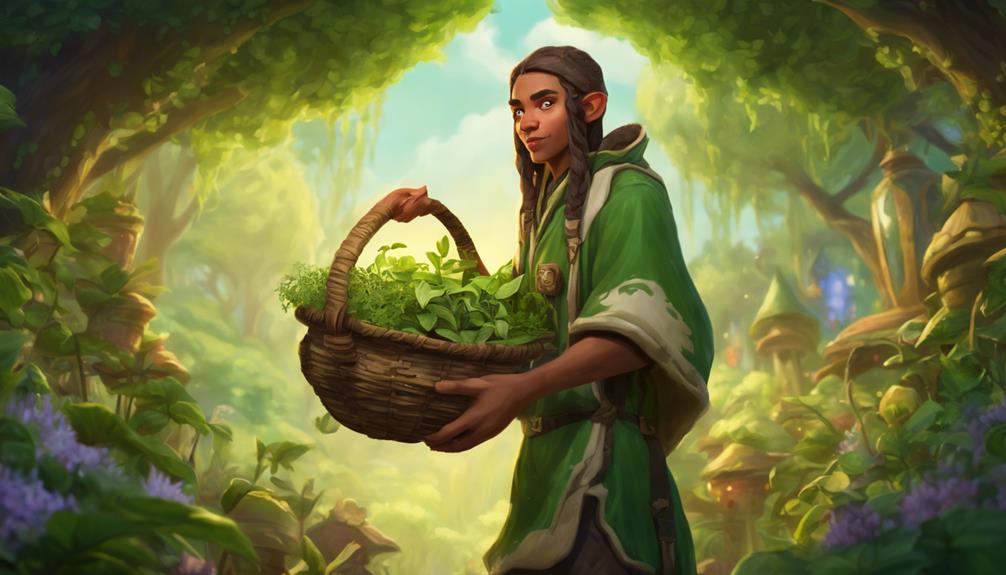
Now that we've found our trainers, it's time to get down to business and learn the basics of Herbalism.
We'll need to master the art of gathering herbs efficiently, so we can stockpile the resources we need to craft valuable potions and flasks.
As we start our journey, we'll focus on identifying the different herbs, preparing for harvest, and optimizing our gathering routes to maximize our yields.
Gathering Herbs Efficiently
As we venture into the world of herbalism, we'll want to master the art of gathering herbs efficiently to maximize our gains. To do so, we'll need to know where to look and how to optimize our gathering process.
Herbalism trainers in major cities can provide guidance on getting started, and they'll teach us how to use a herbalism tool to gather herbs from nodes in the game world.
When exploring the game world, we'll want to keep an eye out for nodes with green leaf icons on the minimap, indicating the presence of herbs. We'll also want to explore different zones and climates to find a variety of herbs, such as Mountain Silversage, Purple Lotus, and Golden Sansam, to level up our herbalism skill.
Additionally, we should stay aware of weather conditions, as rain or snow can affect herb availability. By following these tips, we'll be well on our way to gathering herbs efficiently and maximizing our gains in the world of WoW herbalism.
Herb Identification Guide
We'll need to familiarize ourselves with the different types of herbs we're gathering, so let's learn to identify the various species.
As we explore the vast lands of Azeroth, we'll come across diverse herbs, each with its unique characteristics. Some herbs, like Silverleaf and Peacebloom, are commonly found in starting areas like Mulgore, while others might be hidden in harder-to-reach zones, requiring a flying mount to access.
When searching for a particular herb, understanding that some only thrive in specific weather conditions is crucial, adding an extra layer of complexity to our gathering endeavors.
To make sure we're gathering the correct herbs, we can refer to our minimap, where herbalism nodes are marked with a green leaf icon. By clicking on these nodes, we can gather herbs and level up our herbalism skill.
As we progress, we'll discover more about the unique properties of each herb, allowing us to refine our gathering techniques and become more efficient herbalists.
Preparing for Harvest
To master the basics of herbalism, we must visit a trainer in major cities like Stormwind or Orgrimmar to learn the profession. Once we've learned the ropes, we'll need to obtain a herbalism tool to gather those precious herbs.
We can find these tools by clicking on the green leaf icons on our minimap, which will lead us to our first harvest. As we explore various zones in WoW Classic, we'll discover that each area has its unique set of herbs, so it's crucial to venture out and explore to gather a diverse range of herbs.
However, we'll soon realize that some herbalism nodes require a certain skill level to gather, so we'll need to keep leveling up our herbalism skill to access those coveted herbs. Additionally, completing herbalism quests can provide valuable rewards and materials to aid in leveling up the profession.
Gathering Herbs in Early Zones

We explore the world of herbalism by thoroughly searching the early zones for an abundance of valuable herbs that will help us advance our skills.
As we venture into the starting areas, we're on the lookout for Silverleaf and Peacebloom, which are abundant in Mulgore, Durotar, Tirisfal Glades, Elwynn Forest, and Teldrassil. These herbs are essential for progressing our herbalism skills, and we can't get enough of them!
As we progress, we'll find Mageroyal and Earthroot in zones like Westfall, Silverpine Forest, Loch Modan, and Darkshore. Briarthorn is another valuable herb we'll come across in The Barrens, Hillsbrad Foothills, Wetlands, and Stonetalon Mountains.
We'll also keep an eye out for Bruiseweed in Ashenvale, Stonetalon Mountains, and Hillsbrad Foothills. Finally, Wild Steelbloom can be found in locations like Stonetalon Peak, Arathi Highlands, and Hillsbrad Foothills.
Leveling Up in Outland Regions
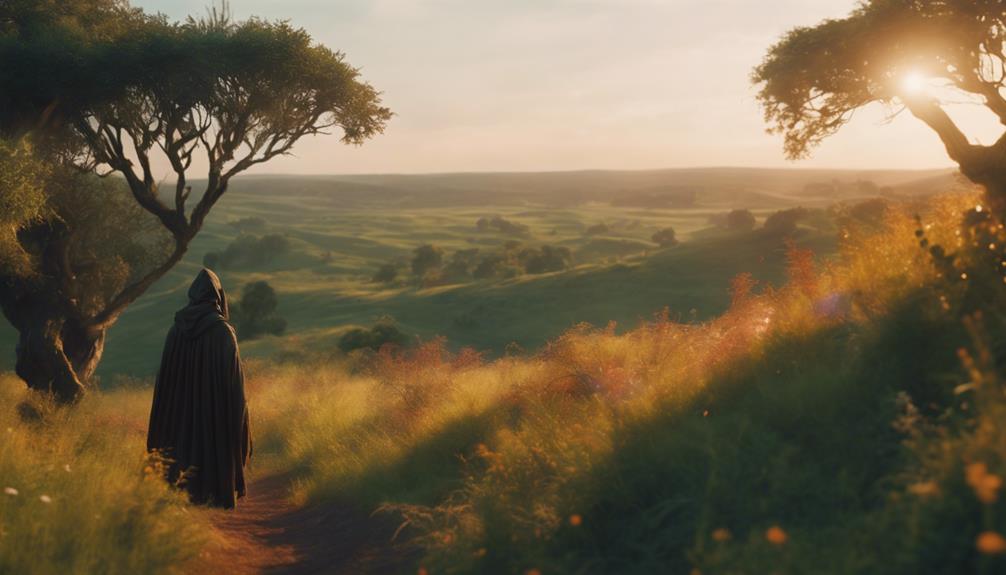
As we venture into the Outland regions, we're excited to explore the most efficient routes for gathering high-level herbs.
We'll navigate through the various zones, identifying the best spots to find rare herbs and optimize our leveling process.
Outland Herbalism Spots
Outland regions offer a wealth of herbalism opportunities, particularly in zones like Hellfire Peninsula, where abundant herb nodes await discovery between levels 300-315. As we venture further into Outland, we find that each zone provides a unique set of herbalism opportunities tailored to our skill level.
| Zone | Level Range | Herb Nodes |
|---|---|---|
| Hellfire Peninsula | 300-315 | Abundant herb nodes |
| Blades Edge Mountain, Nagrand | 315-325 | Herb nodes for leveling up |
| Terokkar Forest | 325-350 | Prime location for herb gathering |
| Netherstorm | 350-375 | Valuable herbs for leveling up |
We find that Blades Edge Mountain and Nagrand offer herb nodes for leveling up from 315 to 325, while Terokkar Forest is a prime location for gathering herbs between levels 325-350. Finally, for levels 350-375, we head to Netherstorm to find valuable herbs for leveling up our Herbalism skill. With such diverse opportunities, Outland regions provide a perfect environment for us to advance our Herbalism skills.
Best Routes for Herbs
To optimize our herbalism leveling in Outland, let's map out the most efficient routes for gathering valuable herbs in each region. We'll explore the best zones for leveling up our herbalism skills, making the most of our time and effort.
Here are the zones we'll focus on for each level range:
- 300-315: Hellfire Peninsula – a hotspot for herbalism leveling
- 315-325: Blades Edge Mountain and Nagrand – explore these areas for abundant herbs
- 325-350: Terokkar Forest – a treasure trove of herbs for leveling up
- 350-375: Netherstorm – the final stretch for maxing out our herbalism skills
To maximize our efficiency, we recommend utilizing addons or guides to optimize our routes and gathering strategies.
By following these routes and tips, we'll be well on our way to leveling up our herbalism skills in no time.
Remember to stay focused, and we'll reach our herbalism goals in Outland in no time!
Zones for Rare Herbs
We'll explore the Outland regions that hold the keys to finding those elusive rare herbs, essential for leveling up our herbalism skills in WoW Classic. As we venture into Hellfire Peninsula, we'll discover Dreaming Glory and Felweed, which will help us level up from 300 to 315.
Next, we'll head to Blades Edge Mountain and Nagrand, where we'll find Terocone and Fel Lotus, taking our skills from 315 to 325.
To reach herbalism skill level 350, we'll focus on gathering Ancient Lichen and Netherbloom in Terokkar Forest.
Finally, Netherstorm offers Nightmare Vine and Mana Thistle, helping us level up from 350 to 375.
Mastering Herbalism in Classic WoW

As we venture into the world of Classic WoW herbalism, we find that mastering this profession requires a strategic approach to gathering and utilizing the rarest and most valuable herbs. To maximize our herbalism skills, we need to focus on the most lucrative herbs, track the market demand, and join forces with other players to share resources.
Here are some key strategies to help us master herbalism in Classic WoW:
- Focus on valuable herbs: Identify the most sought-after herbs and prioritize gathering those to maximize our profits.
- Track the market: Keep an eye on the auction house and adjust our gathering strategy according to market demands.
- Join a guild: Collaborate with other players to share knowledge, resources, and expertise to optimize our herbalism skills.
- Explore extensively: Venture into different zones and areas to discover the rarest and most valuable herbs.
Advanced Herbalism Techniques

By refining our gathering strategy and adapting to market trends, we can now take our herbalism skills to the next level by employing advanced techniques to maximize our profits.
As we progress from levels 330 to 345, we focus on high-demand herbs like Dreamfoil and Mountain Silversage. Beyond level 350, we explore Zangarmarsh for Felweed, Ragveil, and Dreamfoil, taking advantage of the zone's herb diversity.
To optimize our gathering routes, we adapt to our server's population and utilize maps effectively. Understanding market demand is essential, so we monitor trends, selling strategically and diversifying our sales for maximum profitability.
Frequently Asked Questions
Where to Start Herbalism in Wow?
When we start herbalism in WoW, we head to major cities like Stormwind, Orgrimmar, or Ironforge to find a herbalism trainer. They'll teach us the basics.
Then, we explore starting zones like Mulgore, Durotar, or Elwynn Forest to gather herbs. We keep an eye out for green leaf icons on the minimap, marking herbalism nodes.
As we level up, we progress to higher-level zones, revealing new areas and herbs to discover.
Where Is the Best Place to Find Herbs in Wow?
As we venture into the vast world of Azeroth, we're on the hunt for the perfect spot to find those elusive herbs. We've scouted out the best zones, and our top picks include Mulgore, Westfall, and The Barrens, where a variety of herb nodes await.
For higher-level herbs, we head to Stonetalon Mountains, Arathi Highlands, and Tanaris, where the pickings are plentiful.
How to Get Herbalism Knowledge in Wow?
We're enthusiastic to learn herbalism in WoW, and the first step is to find a trainer.
We can visit major cities like Stormwind City, Orgrimmar, or Ironforge to locate a herbalism trainer. They'll teach us the profession and help us level up from Apprentice to Artisan.
One trainer can teach us all levels, so we don't need to search for multiple trainers. With their guidance, we'll be collecting herbs in no time!
How to Gather Herbs in Wow?
As we start our herbalism journey, we're excited to begin gathering those precious herbs.
To do so, we need to keep our eyes peeled for those green leaf icons on our minimap, indicating herbalism nodes.
A simple click on these nodes allows us to collect an array of herbs, such as Silverleaf, Peacebloom, and Briarthorn.
We'll find different herbs in specific zones and under varying weather conditions, so thorough exploration of the game world is crucial.
Conclusion
As we venture forth, our herbalism journey unfolds like a blooming wildflower, its roots digging deeper into the vast expanse of Azeroth.
From novice gatherers to master botanists, we've traversed the territories, unearthing secrets and techniques to cultivate our craft.
With each new discovery, our knowledge blossoms, and our passion for herbalism takes root, forever changing the landscape of our WoW experience.
Herbalism
Find Herbalism: Top 7 Resources
Crafting a holistic wellness journey just got easier with these 7 essential resources for mastering herbalism, but there's more to uncover.
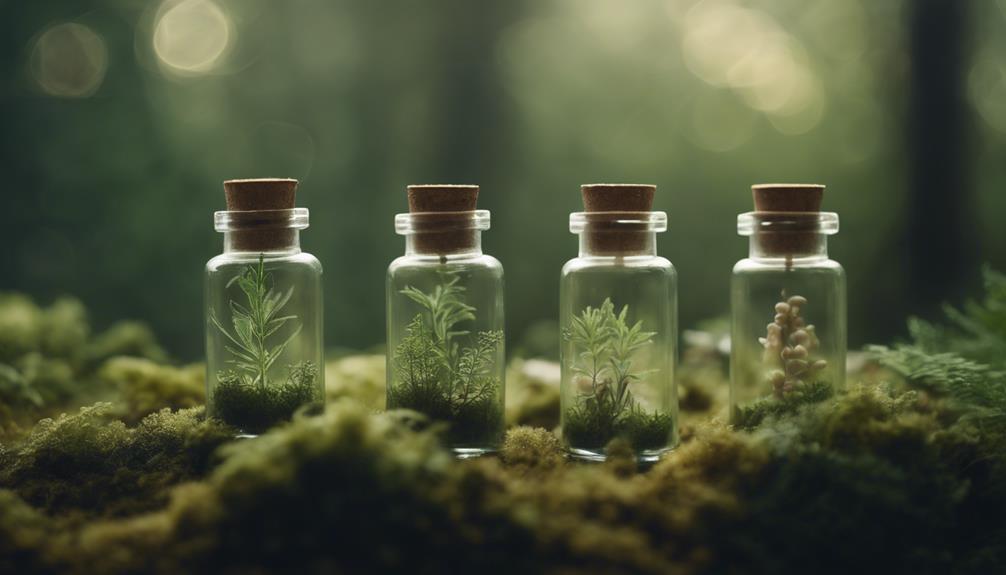
We've gathered the ultimate resources for mastering herbalism, from online platforms to expert-led courses and essential tools. Top online platforms like Herbal Academy and LearningHerbs.com offer extensive guides, while books like 'Herbal Antibiotics' and 'Prescription for Herbal Healing' provide in-depth knowledge. Expert-led courses, herbal communities, and forums facilitate learning and connection. Essential tools like high-quality herbs and mortars help us put knowledge into practice. By prioritizing holistic wellness and self-care, we can optimize our herbalism journey. As we explore these resources, we'll uncover a wealth of knowledge, and there's still more to discover as we venture further into the world of herbalism.
Key Takeaways
• Explore top online herbal platforms like Herbal Academy, LearningHerbs.com, and Mountain Rose Herbs for comprehensive resources and courses.
• Dive into expert-led online courses like Herbalism 101 Essentials and The Herbarium at Herbal Academy for structured learning.
• Join herbal communities and forums like Herbalist Q&A Sessions and Learningherbs.com to connect with experts and enthusiasts.
• Invest in essential herbalism tools and supplies like high-quality herbs, essential oils, and a mortar and pestle for hands-on practice.
• Prioritize holistic wellness and self-care by incorporating herbalism into daily routines and exploring wellness resources for mental and emotional balance.
Exploring Online Herbal Platforms
As we explore the world of herbalism, we're fortunate to have a wealth of online platforms at our fingertips, providing access to a vast array of resources, expertise, and knowledge. One such platform is the Herbal Academy, which offers formal herbal studies and courses for those interested in delving deeper into the world of herbalism.
Beyond the Herbal Academy, we've LearningHerbs.com, where we can tap into the expertise of renowned herbalists like 7Song and Rosemary Gladstar. Additionally, NutritionFacts.org, led by Dr. Michael Greger, provides science-based information on herbal medicines, further enriching our understanding of herbalism.
We're also grateful for EssentialHerbal.com, a community resource created by Tina Sams and Maryanne Schwartz, which serves as a hub for herbal enthusiasts. Lastly, Mountain Rose Herbs offers a free herbalism project with a resource library, providing yet another valuable online platform for our herbal journey.
These online platforms collectively provide a solid foundation for our exploration of herbalism, allowing us to access a wealth of knowledge and expertise at our convenience.
Best Books for Herbal Knowledge

We've curated a selection of the best books for herbal knowledge, each one offering a unique perspective on the world of herbalism.
For those interested in the medicinal properties of plants, 'Herbal Antibiotics' by Stephen Herrod Buhner is a must-read. This detailed guide explores the world of plant-based medicine, exploring the natural alternatives to conventional antibiotics.
Another valuable resource is 'Prescription for Herbal Healing' by Phyllis Balch, an A to Z reference guide that covers a wide range of herbal remedies.
If you're interested in cultivating your own herbs, 'Pawpaws: The Complete Guide to Growing and Marketing' is an excellent resource, offering insights into plant cultivation and marketing.
Online, the Permies.com site basics thread provides a wealth of information on herbal medicine and sustainable living practices.
While we didn't include online courses in this section, the 'Golden Goat Herbals Herbalism and Fermented Sodas Video Course' is worth mentioning, providing a thorough introduction to herbal tea blends and fermentation techniques.
These resources will provide a solid foundation for anyone looking to deepen their understanding of herbalism.
Expert-Led Herbal Courses Online

As we explore the world of herbalism, we're seeking expert guidance to guarantee we're receiving accurate information. That's why we're excited to explore the wealth of expert-led herbal courses online, which offer us a chance to learn from experienced practitioners and establish a solid foundation in herbalism.
With courses like Herbalism 101 Essentials, we can engage in interactive online learning that sets us up for success in our herbal journey.
Herbalism 101 Essentials
Through expert-led online courses, we can explore the world of herbalism in depth, investigating topics like plant identification, herbal preparations, and holistic wellness with structured learning modules and supportive communities.
These courses offer a solid foundation for those interested in herbalism, covering the essentials of herbal medicine. At Herbal Academy, we've access to a wealth of information on herbalism, including a detailed resource library, The Herbarium, which provides in-depth information on herbs, plants, and their medicinal properties.
The Academy Blog also offers free articles and resources, further enriching our understanding of herbalism. With expert-led online courses, we can immerse ourselves in the world of herbalism, gaining a deeper understanding of the principles and practices of herbal medicine.
Learn From Experienced Practitioners
We explore the world of herbalism by enrolling in expert-led online courses, where experienced practitioners like Rosemary Gladstar and 7Song share their knowledge and expertise. These courses provide us with a structured learning experience, allowing us to delve deeper into the world of herbalism.
At the Herbal Academy in Massachusetts, we can find courses that offer optional exams to test and solidify our knowledge in herbal medicine. We can also learn from experienced practitioners through online platforms like Learningherbs.com, where we can gain valuable insights from renowned herbalists. Additionally, Certified Garden Master courses offer live streams and interactions with experienced herbal practitioners, further enhancing our learning experience.
Some online courses, like those by Kate Downham, focus on unique aspects of herbalism, such as personal-scale cheese making. By learning from experienced practitioners, we can gain a more comprehensive understanding of herbalism and its applications. With Rose Herbs being a popular online resource, we've access to a wealth of knowledge at our fingertips.
Interactive Online Learning
By participating in expert-led herbal courses online, we immerse ourselves in interactive online learning experiences that cultivate deeper connections with instructors and like-minded individuals.
We can explore in-depth educational platforms like Herbal Academy in Massachusetts, which offers structured curricula and optional exams to test our knowledge. Alternatively, we can engage in real-time learning with Certified Garden Master courses, featuring live streams that allow us to interact with instructors and fellow students.
Online courses by Kate Downham take a hands-on approach, focusing on personal-scale cheese making, while Learningherbs.com provides a wide range of classes on herbalism.
Additionally, courses like The Healing Properties of Mushrooms offer interactive online learning, delving into the medicinal benefits of mushrooms.
Through these online resources, we can engage in interactive online learning, gaining valuable insights and skills in the comfort of our own homes. By leveraging these expert-led courses, we can expand our knowledge and connect with others who share our passion for herbalism.
Herbal Communities and Forums

As we explore the world of herbalism, we're not alone – there are many online communities and forums where we can connect with fellow enthusiasts and experts. From herbalist Q&A sessions to online forums, these platforms offer valuable opportunities to ask questions, share knowledge, and learn from one another.
Herbalist Q&A Sessions
In addition to participating in Herbalist Q&A sessions through online herbal communities and forums, we regularly engage with seasoned practitioners to tap into their collective knowledge and experience. These sessions provide us with a unique opportunity to ask questions, clarify doubts, and gain valuable insights from experienced herbalists.
By taking part in Herbalist Q&A sessions, we can explore different perspectives and approaches to herbalism, receive personalized advice and recommendations for herbal remedies and practices, and stay updated on the latest trends, research, and information in the world of herbalism.
Furthermore, these sessions allow us to connect with a community of like-minded individuals who share our passion for herbalism. We can actively engage in discussions, share our own experiences, and learn from others in a supportive and collaborative environment.
Online Herbal Forums
We turn to online herbal forums, such as Learningherbs.com and Nutritional-Solutions.net, to tap into the collective knowledge of experienced herbalists and like-minded individuals. These herbal forums provide a platform for us to connect with others who share our passion for herbalism, allowing us to learn from each other's experiences and gain valuable insights.
For instance, the forum on NutritionFacts.org covers a wide range of topics related to herbal remedies, providing evidence-based information for those interested in herbal medicine. Similarly, The Essential Herbal community is a well-regarded resource for herbalists looking to connect with like-minded individuals, share tips, and expand their knowledge in the field of herbalism.
Essential Herbalism Tools and Supplies
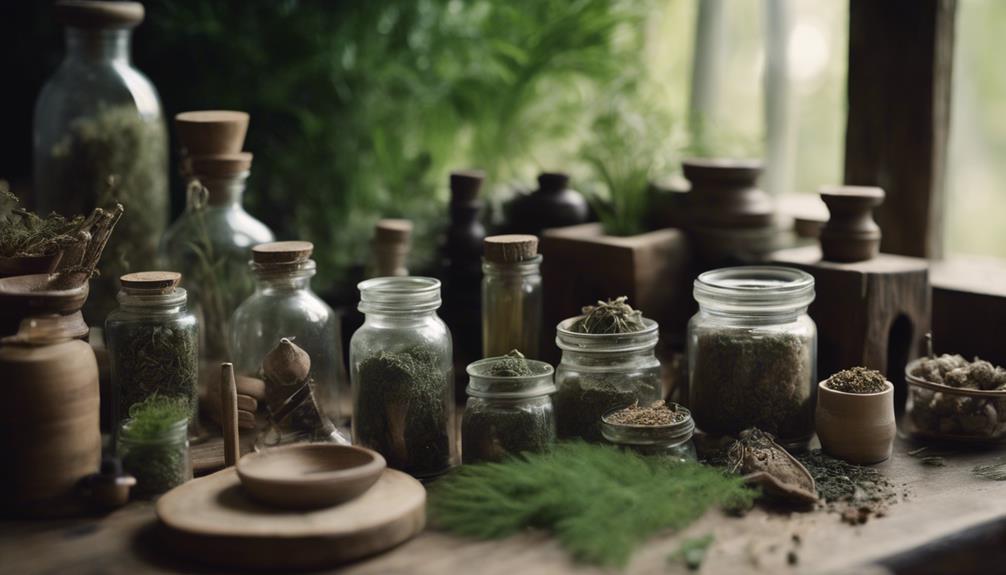
When it comes to building a solid foundation in herbalism, having the right tools and supplies is essential, and Mountain Rose Herbs is a trusted source for high-quality herbs, essential oils, and herbal supplies. We've found that investing in the right equipment can make all the difference in our herbalism journey.
Here are some essential herbalism tools and supplies we recommend:
| Tool/Supply | Description |
|---|---|
| High-quality herbs | Fresh, organic herbs for teas, tinctures, and salves |
| Essential oils | Pure, unadulterated oils for aromatherapy and skincare |
| Mortar and pestle | For grinding and mixing herbs and spices |
| Herbalism books | Detailed guides to herbalism, like Tamed Wild's Wild Medicine Deck |
Holistic Wellness and Self-Care
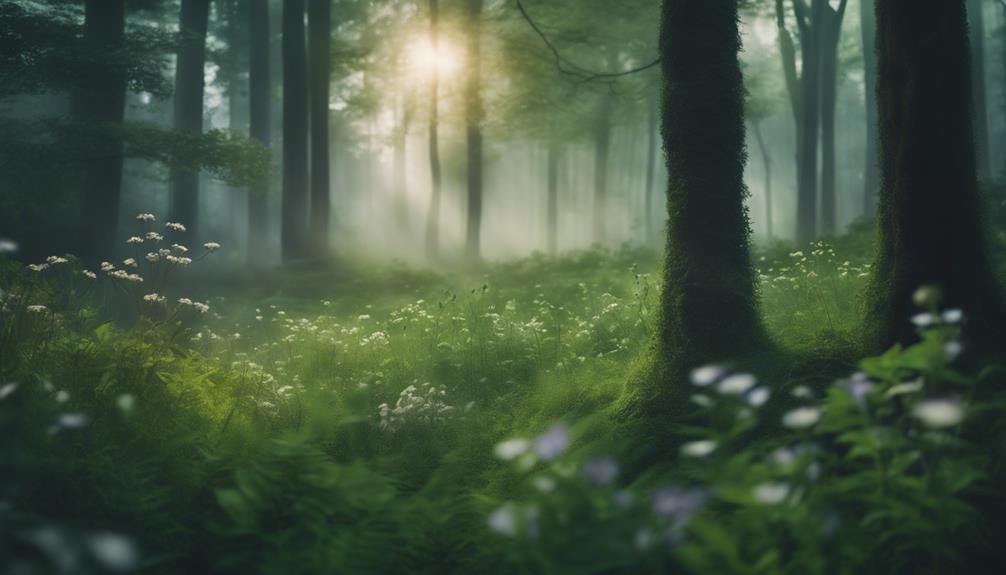
In addition to exploring the world of herbalism, we're reminded that nurturing our overall well-being is just as important as crafting the perfect herbal remedy.
Holistic wellness isn't just about physical health, but also mental and emotional balance. This winter, we can prioritize our well-being by staying hydrated, getting enough sleep, and incorporating immune-boosting herbs into our routine. By setting achievable goals and prioritizing mental health, we can improve our overall health by year-end.
Additionally, we can explore various wellness resources, such as online courses, books, and community groups focused on holistic health and self-care practices. Sharing and discovering wellness tips within communities can provide valuable insights, support, and inspiration for incorporating herbalism and self-care into our daily lives.
Advanced Herbal Education Institutes

Through advanced herbal education institutes, we're immersing ourselves in our herbalism skills to the next level, delving into specialized courses and programs that refine our knowledge and techniques.
In Massachusetts, the Herbal Academy offers structured courses with optional exams for advanced herbal education. For those seeking interactive learning, Certified Garden Master courses provide live streams, offering in-depth knowledge.
If culinary herbalism is our focus, Kate Downham's online courses on personal-scale cheese making enhance our skills. At Learningherbs.com, we find a range of classes catering to different levels of expertise.
For a deeper exploration into advanced herbal medicine, The Healing Properties of Mushrooms course explores the medicinal benefits of mushrooms. These institutes provide a wealth of knowledge, allowing us to expand our understanding of herbalism.
Frequently Asked Questions
Where Is the Best Place to Study Herbalism?
When we're looking to study herbalism, we're often wondering where to start. We might ask ourselves, 'Where is the best place to study herbalism?'
The answer isn't one-size-fits-all, as it depends on our learning style and goals. We might prefer structured courses like those offered by The Herbal Academy, or online classes with a more personalized approach, like Kate Downham's courses.
Whatever our choice, we're taking the first step towards a deeper understanding of herbalism.
Can You Be a Self-Taught Herbalist?
We can definitely be self-taught herbalists. Many successful herbalists have learned through self-study, using resources like books, online courses, and community forums.
We can start by building a solid foundation with basic herbalism books and online courses from reputable sources. Then, we can gain practical experience by growing and working with herbs, experimenting with remedies, and seeking guidance from experienced herbalists.
What Is the Difference Between a Herbalist and a Herbologist?
We often get asked about the difference between a herbalist and a herbologist. Simply put, a herbalist focuses on using herbs for medicinal and therapeutic benefits, often working directly with clients to provide personalized remedies.
On the other hand, a herbologist studies plants for various purposes, including medicinal properties, and may conduct research or teach.
While both roles promote the use of plants for health and well-being, herbalists focus on practical applications, whereas herbologists focus on scientific study and research.
How Long Does It Take to Become a Herbalist?
We're often curious about the time it takes to become a herbalist. Let's investigate this theory!
The answer varies greatly, ranging from a few months to 4 years, depending on the level of education and training pursued.
Short programs can provide basic knowledge in weeks or months, while formal certification programs take around 1-2 years, and advanced training can take up to 4 years.
Conclusion
As we conclude our journey to find herbalism, we're reminded that 80% of the world's population relies on traditional medicine, with herbalism being a significant part of it.
With the resources we've gathered, we're empowered to take control of our health and wellness.
From online platforms to expert-led courses, and from books to essential tools, we've got the knowledge and support to navigate the world of herbalism.
-

 Herbalism2 months ago
Herbalism2 months agoDoes Herbalism Actually Work?
-

 Anti Aging2 months ago
Anti Aging2 months agoMost Effective Anti-Aging Drink: 5 Top Picks
-

 Bone Health2 months ago
Bone Health2 months agoHerbal Secrets Unleashed: Boost Bone Density
-

 Anti Aging2 months ago
Anti Aging2 months agoWhich Tea Increases Lifespan?
-
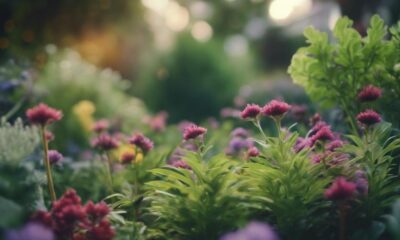
 Anti Aging2 months ago
Anti Aging2 months agoThe Immortal Herb: Unveiling Its Special Qualities
-
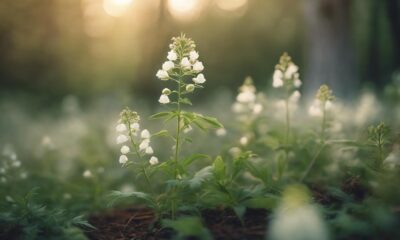
 Anti Aging1 month ago
Anti Aging1 month agoAstragalus: The Ultimate Anti-Aging Herb
-
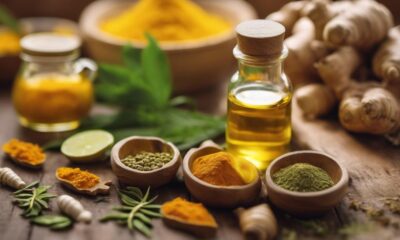
 Inflammation Management2 months ago
Inflammation Management2 months agoBest Natural Medicines for Joint Inflammation Relief
-
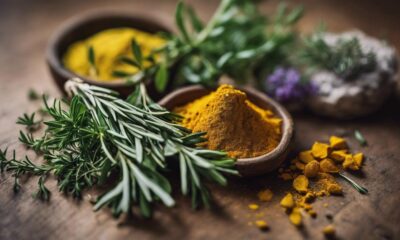
 Mental Health2 months ago
Mental Health2 months agoBest Herbs for Boosting Brain Health


















